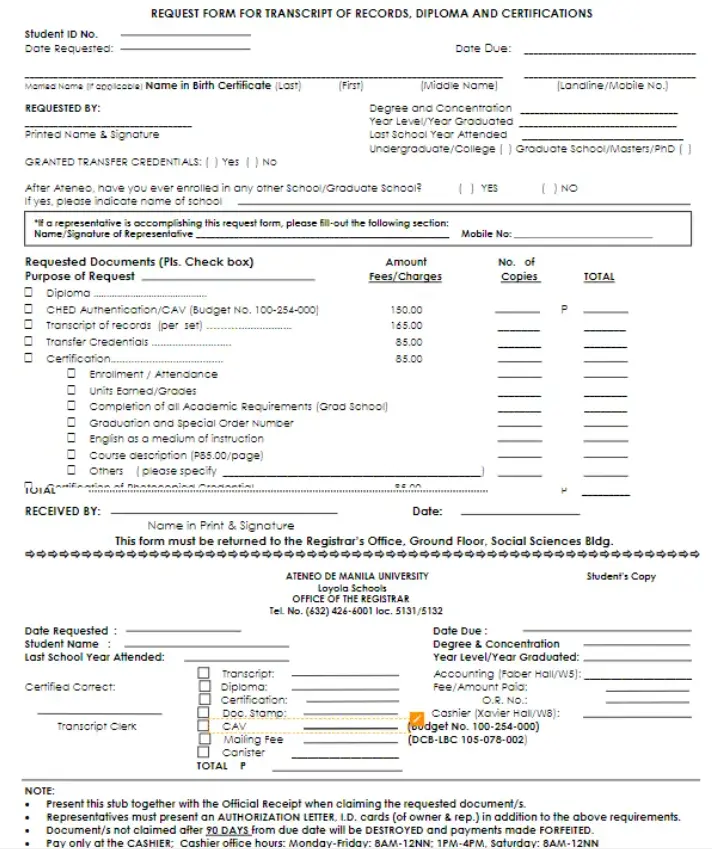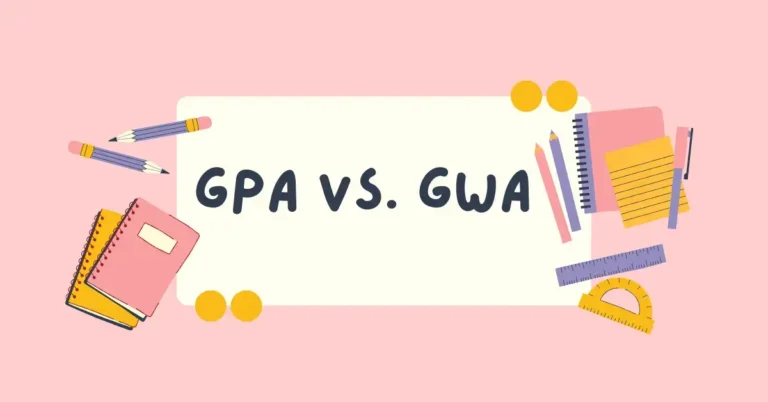Importance Of Transcript Of Records Philippines – Request for Documents

Contents
- What is a Transcript Of Records?
- How To Get Transcript Of Records Philippines
- What Does a Transcript of Records Philippines Include?
- How to Request a Transcript of Records Philippines?
- When is the right time to request a Transcript of Records?
- Important Components Of Transcript of Records
- What should I do if I need to leave and my Transcript of Records is not yet prepared?
- Understanding the Legal Side of Educational Transcripts
- Understanding the European ECTS System’s Transcript Records
- Conclusion
- FAQs
When you’re getting ready to study abroad, whether it’s just for a bit or a whole degree, you’ll have some paperwork to do. One important paper is your school records, which are like a report card. It’s connected to another paper called Your Learning Plan. This plan is like a to-do list for the classes and stuff you need to do while you’re away.
Make sure you fill in your report card info correctly. The learning plan needs to be signed and okayed by your home school and the school you’re visiting. If there are any changes, all three (both schools and you) need to agree on them. Think of the Learning Agreement and transcript of records as your academic badges for studying abroad. They say, “Hey, I did this work, and here’s how many credits I earned!”
Check Out: GWA Calculator
What is a Transcript Of Records?
A Transcript of Records is an official document. It lists a student’s academic achievements. It includes information about the courses completed, grades received, and credits earned. The college or university usually provides the TOR. It shows academic progress. It is often needed to recognize qualifications in the Philippines and abroad.
Think of the Transcript of Records as your school report for applying to a foreign university. If you’re in an exchange program, you’ll also get another report at the end of your studies from the university where you took classes. This report lists all the classes you took, the tests you passed, and the points you earned. It includes details like the class code (a specific code for each class), the class title, how long the class lasted, your test grade (which is important for getting your points), and the credits you earned.
If your home university doesn’t use the same system, the report should explain how things work. When sending the report online, you can explain the grading scale used during your study. This explanation should make clear which grades are the best and worst. Your school records can be filled out by you, your home school, or the foreign school’s office, depending on their rules. Usually, the report is completed after passing all the tests listed in the Learning Agreement, and usually, only the passed classes will be included, not the ones you didn’t pass.
How To Get Transcript Of Records Philippines
Getting your transcripts in the Philippines is easy! Just follow these simple steps:
- Your academic info is private and will only be shared when you ask for it. Head to the University Registrar’s Office, hand in your student clearance, and fill out a transcript request.
- Each page of your transcript costs PhP50.00 to prepare.
- If you’re a graduate, don’t wait! Ask for your transcripts ASAP to avoid any unnecessary delays.
A quick tip: Thanks to Republic Act No. 11261, there’s a small government fee for getting your hands on this important document.
Here is a Certified Copy Transcript Of Records

What Does a Transcript of Records Philippines Include?
A transcript can look different depending on where you go to school. But generally, it will have:
- Your name and school
- Your classes and when you took them
- Names of your classes
- How long your classes were
- Grades or scores you got
- A stamp from the school
- Someone important’s signature
How to Request a Transcript of Records Philippines?
If you want to study abroad in the Philippines, you’ll need to ask for your school papers. Here’s an easy guide:
- Contact Your School: Start by talking to your school’s office. Ask them what you need to do to get your papers. You can check their website or just call them.
- Fill Out a Form: Schools usually have a special paper request form. Fill it out with your name, student ID, and contact info.
- Pay Money: Sometimes, you have to pay a bit of money to get your papers. Ask your school how much and how to pay. It could be cash, a bank payment, or online.
- Get Permission, If Needed: If someone else is picking up your papers, the school might ask for permission. Write a note saying it’s okay if someone else gets them for you.
- Wait for Your Papers: It takes some time for your papers to be ready, usually a few days or weeks. Plan early if you have a deadline.
- Pick Up or Deliver: When your papers are ready, you can either go get them at school or ask for delivery through a mail service. If you pick them up, bring an ID.
- Check Your Papers: Before you leave or get them from the mail, check your papers. Make sure all your grades and info are correct.
- Ask for More Copies: If you need more than one copy, ask for them all at once to save trouble later. You might have to pay extra.
- Keep Your Papers Safe: Your papers are important, so keep them in a safe place. You might need them for jobs, more school, or moving to another country. Safe papers mean no worries.
When is the right time to request a Transcript of Records?
Typically, you’d leave obtaining the transcript until later in your exchange program because it encompasses the exams you’ve taken, whether you’ve passed or not.
To expedite the process of getting your Transcript of Records ready, you can take the initiative. After successfully passing an exam, approach your professor and request them to note down your results in the “Local Grade” section of the rough copy. Later, you can fill in the remaining sections with the necessary information.
Once your Transcript of Records is filled out, simply submit it, along with the other required application documents, to your home International Office.
Important Components Of Transcript of Records
| # | Component | Explanation |
|---|---|---|
| 1. | Student’s Info | Full name, ID number, and other personal details. |
| 2. | College/University Details | College/university name, transcript issue year, dean/director’s name, and the official seal. |
| 3. | Completed Courses | Details on each completed course, including course number, title, credit points, grades, and semesters taken. |
| 4. | Grade Points | Presentation of grades achieved and corresponding grade points. |
| 5. | Credit Points | Total credits earned during the student’s studies. |
| 6. | Grade Point Average | Overall grade point average, combining all grades. |
| 7. | Academic Status | Information on the student’s academic standing, such as good standing, expulsion, or temporary suspension. |
| 8. | Additional details like degrees, academic awards, or special programs may be listed in this section. | Additional details like degrees, academic awards, or special programs that may be listed in this section. |
See the Philippines Transcript of Records Table for all your academic records and where to get them, along with the fees.
| NO | Academic Record | Issuing Office | Processing Period | Fee |
| 1. | Diploma | Registrar’s Office | Twelve Working Days | PHP 450.00 |
| 2. | Transcript of Records | |||
| Finished Studies | Registrar’s Office | Twelve Working Days | PHP 250.00 | |
| Unfinished studies | Registrar’s Office | Twelve Working Days | PHP 200.00 | |
| 3. | Honorable Dismissal | Registrar’s Office | Seven Working Days | PHP 80.00 |
| 4. | Certification of Graduation | Registrar’s Office | Three Working Days | PHP 65.00 |
| 5. | Certification of Medium Instruction | Registrar’s Office | Three Working Days | PHP 65.00 |
| 6. | Certification of Weighted Average | Registrar’s Office | Three Working Days | PHP 65.00 |
| 7. | Authentication of Records | Registrar’s Office | One Day* | PHP 50.00 |
| 8. | Course Descriptions | Dean’s Office | Varies by College | Varies by College |
| 9. | Course Syllabi | Dean’s Office | Varies by College | Varies by College |
What should I do if I need to leave and my Transcript of Records is not yet prepared?
No need to stress if your Transcript of Records isn’t ready when you have to leave, especially for Erasmus students. Typically, exams happen in the final weeks of the Erasmus period, and it might take a bit to get all the grades sorted for the transcripts. But don’t worry!
Your home or host institution can provide an official interim transcript, showing your grades up to that point. Just send an email to your professors, asking them to directly send the results to the International Office, which will complete the document for you. Once your exam results are registered, three hard copies of your transcript will be sent to the International Office. Your home university will then forward one or two hard copies directly to you.
Understanding the Legal Side of Educational Transcripts
Transcripts of Records, those papers summarizing your education, come with some important rules. Here’s a simple breakdown:
- Be Honest: Don’t fake it. Keep your academic records real.
- Keep it Private: Your grades are your business. Privacy laws make sure of that.
- Verify Yourself: Confirm your records. Make sure they’re yours.
- Job Matters: Your transcripts can affect your job opportunities.
- No Cheating!: Trying to trick with fake records is a big no-no.
- Check Accreditation: Make sure your school is recognized. It matters.
- No Fake Transcripts: Don’t create fake records. It’s against the law.
- Access Rules: Understand who can see your transcripts.
- Hold on to Records: Keep your records safe for a while.
- No Discrimination: Your grades shouldn’t lead to unfair treatment.
Remember, these rules can change depending on where you are. So, always follow the education laws in your area. Messing with your transcripts can land you in serious trouble.
Understanding the European ECTS System’s Transcript Records
The Transcript of Records in the European ECTS (European Credit Transfer and Accumulation System) is like the academic passport for students in Europe. It’s a standardized document that every European university uses. Here’s a quick rundown of what it includes:
- Personal Info: Just the basics about you.
- School Details: Info about the university you’re attending.
- Your Program: What you’re studying.
- When and What: Academic calendar and details about each course.
- Credits Earned: The ECTS credit system in action.
- Grading Scale: How they measured your success.
- Decoding the Transcript: A key to understanding all the info.
- Official Stamps: Signatures and seals make it legit.
- How Well You Did: Your grades and results.
It’s like your educational ID, So Keep it Safe.
Conclusion
In the Philippines, your school grades paper Such as Transcript of Records is super important. It tells about your studies and helps with things like studying in another country or getting a job. This paper shows what degree you got, your grades, and the percentage you got. You can use a special calculator to find this out. Keeping this paper updated is like having a secret code for schools and jobs to know how good you are at your studies. Just make sure to keep it safe, and it can open doors for you.
FAQs
How do I get a transcript of a document?
Request a transcript from the issuing institution or use online platforms for document retrieval.
What is in a Transcript of Records?
A Transcript of Records includes details like degree, grades, and academic achievements.
What is OTR in college?
OTR in college typically refers to an Official Transcript of Records.
What is the meaning of Tor in school?
In school, TOR stands for Transcript of Records, summarizing academic performance.
What is the difference between a transcript and a certificate?
A transcript details the academic history, while a certificate confirms completion of a specific program or course.
How to Request a Transcript of Records (TOR) in School?
To request a Transcript of Records (TOR) from your school, check its website for the requirements. Or, ask the registrar’s office. Gather the necessary documents, such as your ID, and complete the TOR request form. Submit the form and documents to the registrar, either in person or online, and pay any fees if needed. After processing, you will receive your TOR by mail or for pick-up. Following these steps will help you easily obtain your transcript of records.






